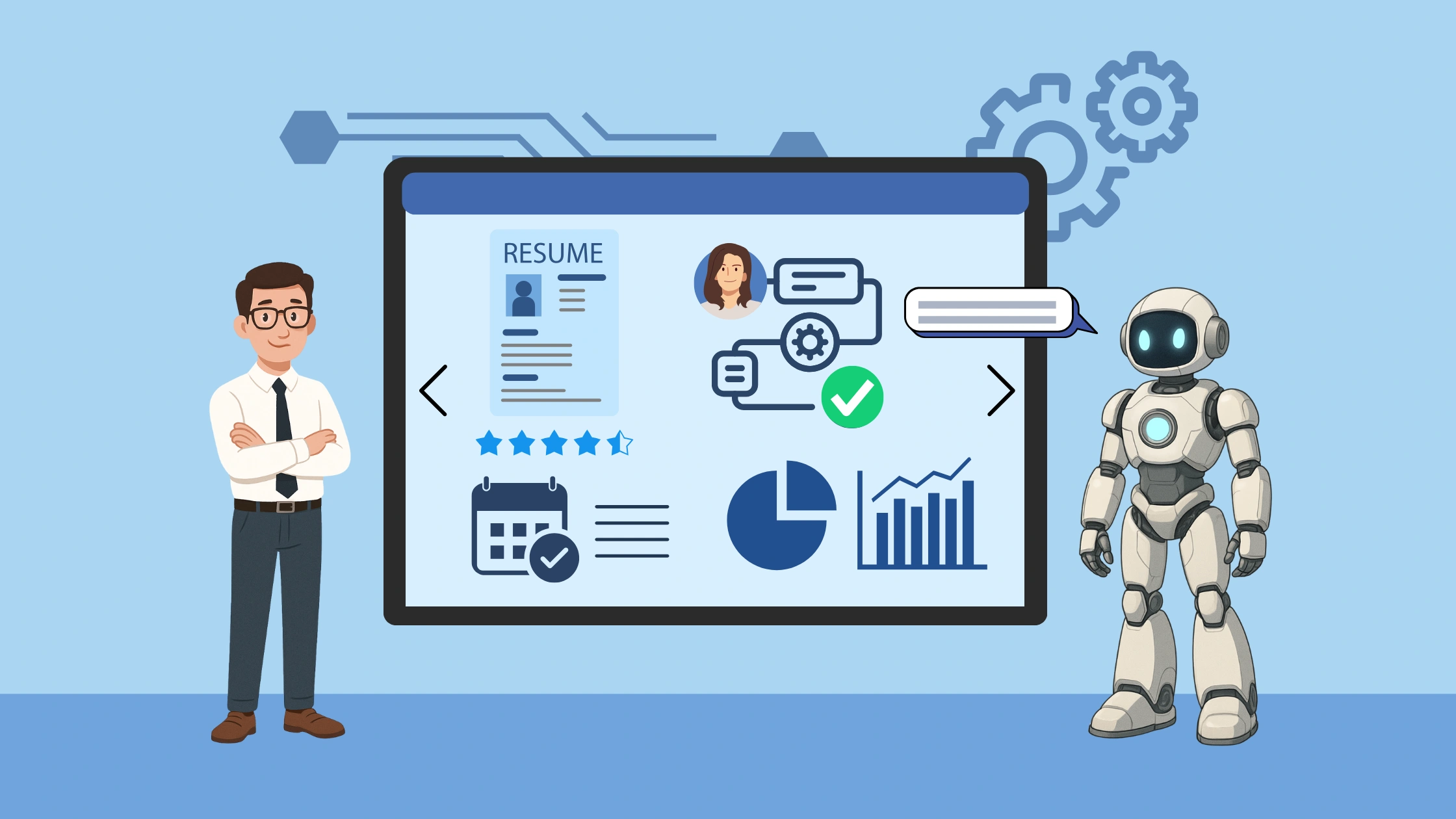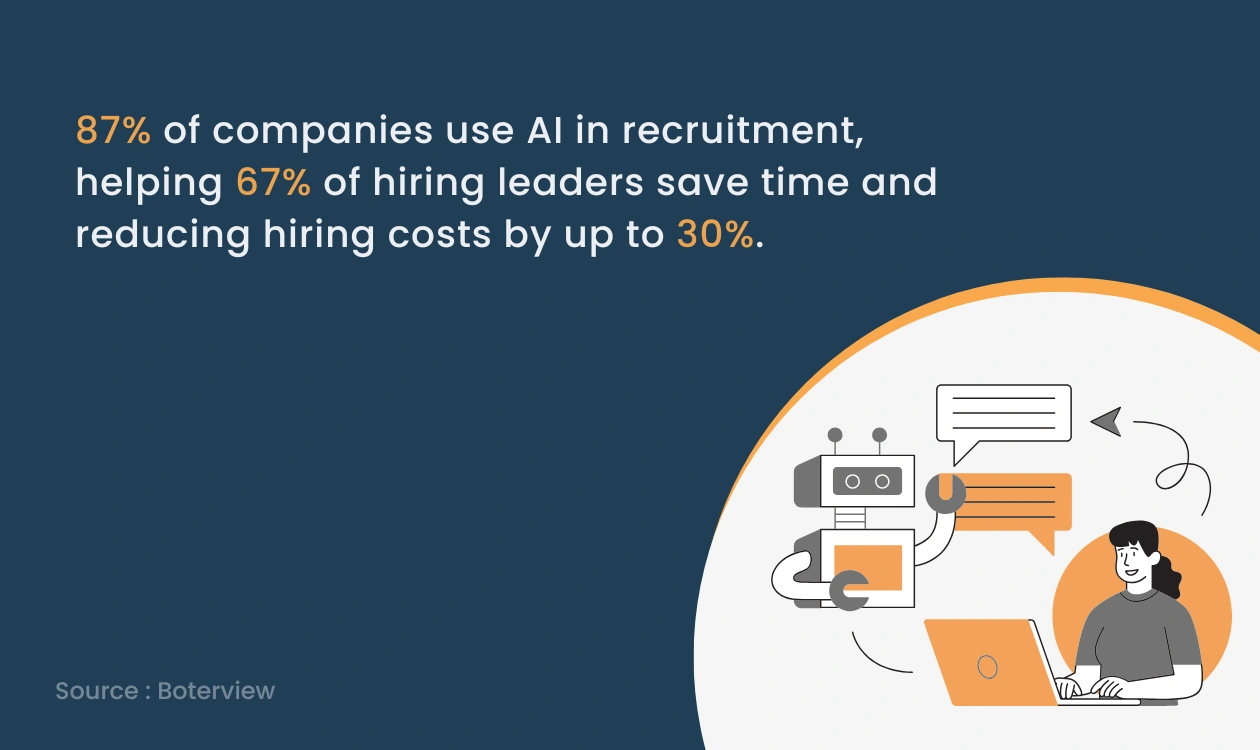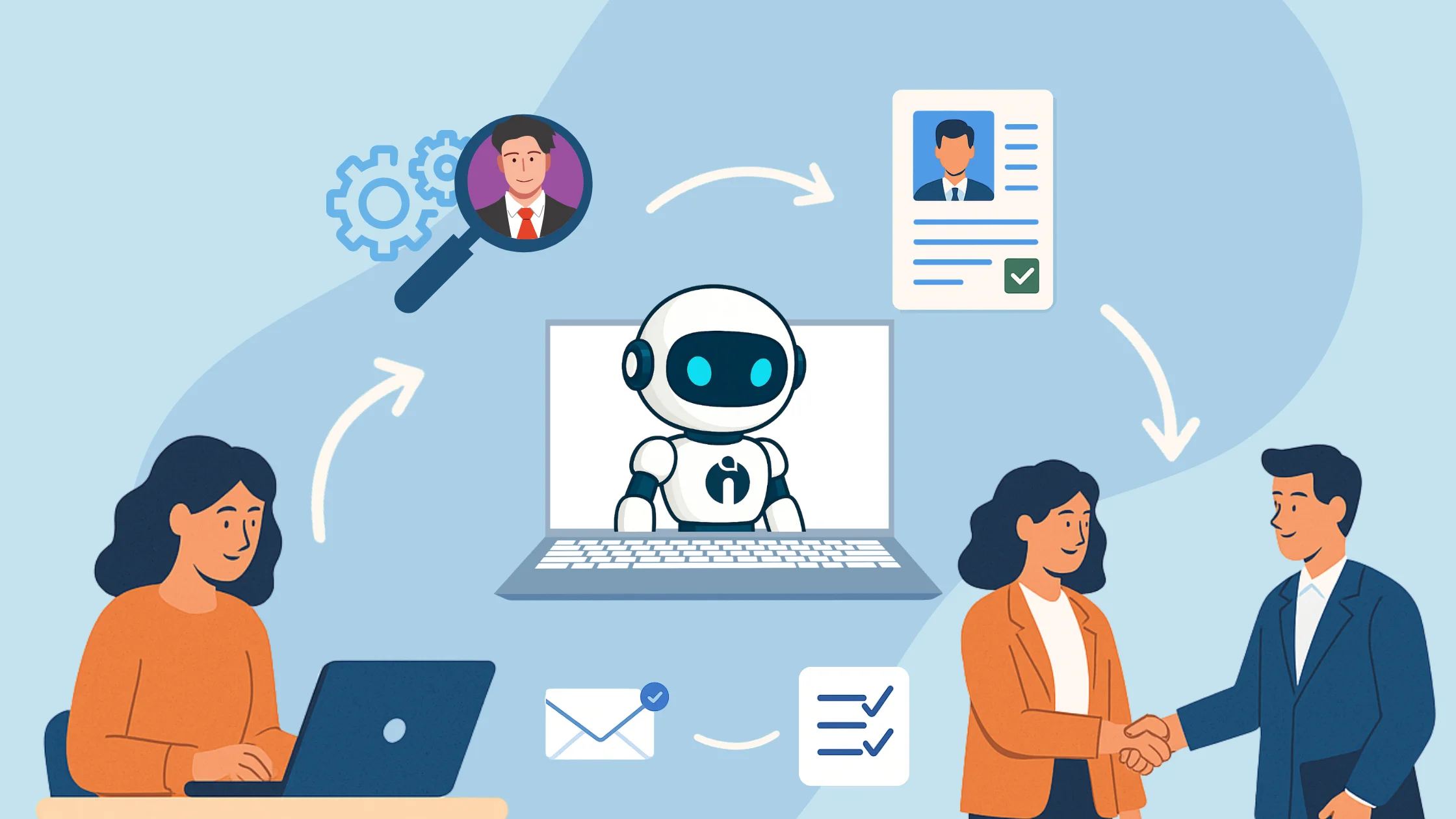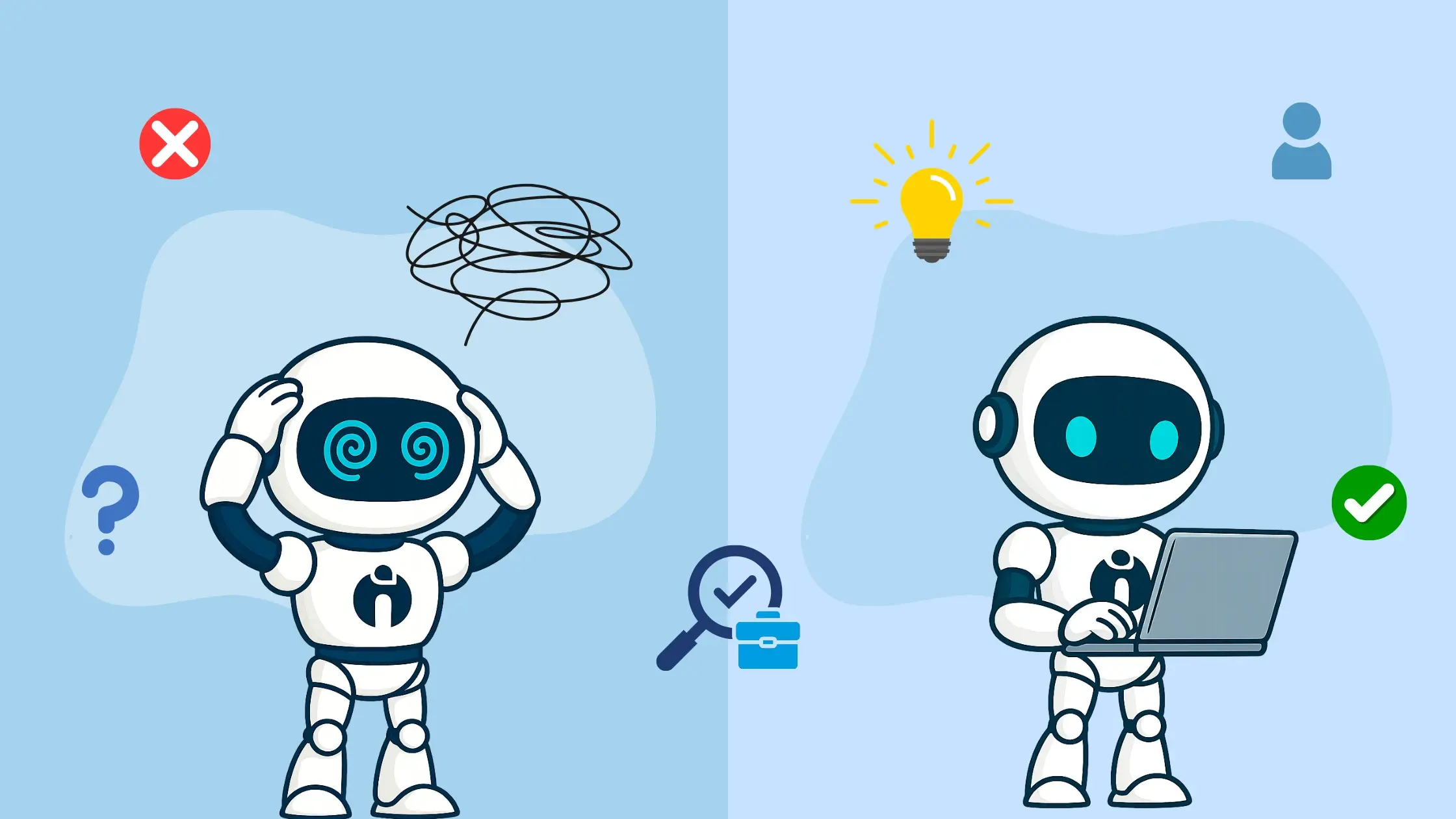TL;DR
- AI agents streamline recruitment by automating sourcing, screening, and scheduling.
- They reduce time-to-hire and hiring costs while improving candidate quality and experience.
- AI supports diversity by reducing bias and broadening talent pools.
- Data-driven insights from AI help organisations make better hiring decisions.
Recruitment is evolving rapidly, and artificial intelligence (AI) is at the forefront of this transformation. Traditional hiring methods, which often rely on manual processes, can be slow, time-consuming, and prone to inefficiencies. AI agents in recruitment are helping organisations hire faster, smarter, and more effectively by automating repetitive tasks and enhancing candidate engagement.
These intelligent systems streamline key recruitment activities, from sourcing and screening candidates to scheduling interviews and providing timely updates. By taking care of routine tasks, AI agents allow recruiters to concentrate on strategic decisions, talent assessment, and building meaningful relationships with candidates.
Here, we will explore the top use cases of AI agents in recruitment, the strategic benefits they offer, and how they are revolutionising the hiring process in 2026.
What Are the Top Use Cases of AI Agents in Recruitment?
The recruitment landscape is evolving rapidly, and AI agents are at the forefront of this transformation. Organisations today are leveraging AI in recruitment to improve efficiency, reduce bias, and make smarter hiring decisions. From sourcing candidates to predictive analytics, AI helps recruiters focus on what truly matters: connecting with the right talent. Here are the top use cases of AI agents in recruitment, with practical examples and benefits for modern hiring teams.
According to Boterview, around 87% of companies now use AI in recruitment, with 67% of hiring leaders reporting significant time savings. AI adoption also helps reduce hiring costs by up to 30%, allowing recruiters to focus on more strategic tasks.
1. Candidate Sourcing and Talent Targeting
Finding qualified candidates can be challenging, especially for niche roles or industries with talent shortages. AI recruitment systems help recruiters automatically scan resumes, job boards, and professional networks to identify candidates who match job requirements. Advanced algorithms can even uncover passive candidates, those not actively looking for a job but open to opportunities, helping organisations build a stronger talent pipeline.
How it works:
- Recruiters input detailed role requirements, and AI generates a list of potential candidates.
- Candidates are ranked based on skills, experience, education, and relevance to the role.
- AI tracks passive candidates over time, notifying recruiters if someone becomes a better fit.
Benefits:
- Reduces time spent on sourcing candidates.
- Access to a higher-quality talent pool, including passive candidates.
- Enables recruiters to focus on engagement rather than manual searches.
Impact: Organisations using AI for sourcing report faster identification of suitable talent, better placement success rates, and improved recruitment outcomes for hard-to-fill roles.
Example: A tech company filled five highly specialised AI development positions within a month using AI-powered sourcing, compared to three months with traditional methods.
2. Resume Screening and Shortlisting
Manually evaluating hundreds of resumes can be tedious and prone to human error. AI recruitment software evaluates candidates objectively, ranking resumes based on skills, experience, qualifications, and cultural fit. This not only speeds up the recruitment process but also reduces unconscious bias.
How it works:
- AI scans resumes for keywords, experience, certifications, and achievements.
- Shortlists are generated automatically, highlighting top candidates for recruiter review.
- AI can detect inconsistencies or gaps in employment, helping recruiters make informed decisions.
Benefits:
- Reduces time-to-hire significantly.
- Ensures fair and consistent evaluation criteria.
- Frees recruiters to focus on meaningful engagement with candidates.
Impact: Organisations see more efficient recruitment cycles and improved quality of hire.
Example: A recruitment agency reported a 50% reduction in time spent on screening by using AI to shortlist candidates for multiple positions simultaneously.
3. Job Description Creation and Optimisation
Crafting job descriptions that attract top talent is often challenging. AI in recruitment can generate clear, inclusive, and optimised postings that resonate with the right audience. It can also analyse existing descriptions to identify language that may unintentionally discourage certain candidates, helping organisations improve diversity.
How it works:
- AI generates role-specific job descriptions optimised for clarity, inclusivity, and engagement.
- Job postings can be automatically distributed across multiple platforms, including social media and job boards.
- AI suggests keywords to improve visibility and attract higher-quality candidates.
Benefits:
- Faster creation and posting of job descriptions.
- Consistent messaging across platforms.
- Attracts more qualified and diverse applicants.
Impact: Organisations using AI-driven job description tools often receive a larger number of high-quality applications and experience higher engagement rates.
Example: A multinational company used AI-generated descriptions for sales roles, increasing applications from qualified candidates by 35% within two months.
4. Interview Scheduling and Coordination
Scheduling interviews can be complex, especially for roles requiring multiple stakeholders. Recruitment workflow automation powered by AI simplifies this process by managing calendar coordination, reminders, and reschedules. Candidates and recruiters both benefit from a seamless experience.
How it works:
- Candidates select suitable slots via an automated system integrated with the recruiter’s calendar.
- AI sends automated reminders and manages rescheduling when needed.
- Integration with email and messaging platforms ensures smooth communication.
Benefits:
- Reduces administrative burden on recruiters.
- Minimises scheduling conflicts and delays.
- Enhances candidate experience with timely communication.
Impact: Many organisations report a 30-40% reduction in scheduling delays, allowing recruiters to dedicate more time to assessment and engagement.
Example: A global firm reduced missed interviews by 25% by using AI-powered scheduling tools.
5. Pre-Screening and Candidate Engagement
Engaging candidates early is crucial for maintaining interest and improving completion rates. Conversational AI automates pre-screening by asking candidates standard questions, analysing responses, and providing instant feedback. Chatbots can also answer queries in real time, ensuring a smoother experience.
How it works:
- Candidates complete pre-screening through AI chatbots.
- AI evaluates responses and flags suitable candidates for recruiters.
- Chatbots provide instant answers to common candidate questions.
Benefits:
- Reduces recruiter workload in early-stage screening.
- Keeps candidates informed and engaged.
- Maintains a consistent and positive candidate experience.
Impact: Organisations notice higher application completion rates and better candidate satisfaction.
Example: An e-commerce company increased pre-screening completion rates by 40% using AI chatbots.
6. Candidate Profiling and Workflow Automation
AI recruitment software compiles candidate information from multiple sources into structured profiles. Combined with workflow automation, it helps manage reminders, follow-ups, and task assignments, reducing manual work and improving decision-making.
How it works:
- Candidate data from resumes, assessments, and interviews is automatically structured.
- Workflows handle tasks such as follow-ups, interview reminders, and internal notifications.
- Recruiters can view comprehensive candidate profiles at any stage of recruitment.
Benefits:
- Reduces repetitive administrative tasks.
- Provides instant access to complete candidate profiles.
- Ensures smooth transitions between recruitment stages.
Impact: Organisations experience increased efficiency and reduced risk of overlooking candidates.
Example: A staffing agency used AI workflow automation to manage over 500 applicants per month without additional staff.
7. Data-Driven Insights and Predictive Analytics
AI helps organisations make data-driven hiring decisions by analysing recruitment data to uncover trends and predict candidate success. This enables better workforce planning, reduces turnover, and helps recruiters optimise their strategies.
How it works:
- Tracks KPIs like time-to-hire, source effectiveness, and retention likelihood.
- Predicts which candidates are likely to succeed and remain long-term.
- Provides actionable insights to refine recruitment strategies.
Benefits:
- Supports smarter hiring decisions.
- Improves workforce planning and forecasting.
- Reduces the risk of poor hires.
Impact: Organisations refine recruitment strategies and make better hiring choices based on predictive analytics.
Example: A healthcare company predicted candidate retention and reduced first-year attrition by 20% using AI-driven insights.
8. Enhancing Candidate Experience
A positive candidate experience is vital for employer branding. AI agents provide automated updates, personalised messages, and timely feedback to keep candidates engaged throughout the hiring journey.
How it works:
- Candidates receive automated updates about application status.
- Personalised messages guide candidates through assessments and interviews.
- Feedback is delivered promptly, maintaining transparency and trust.
Benefits:
- Higher application completion rates.
- Improved employer branding.
- Better offer acceptance rates.
Impact: Organisations see stronger candidate engagement and a more positive perception of their recruitment process.
Example: A technology firm improved candidate satisfaction scores by 30% by implementing AI-driven communication.
9. Supporting Diversity and Inclusion Efforts
AI helps reduce bias in hiring by evaluating candidates based on skills and experience rather than demographic factors. AI recruitment tools ensure fairer evaluation, broaden talent pools, and support diversity initiatives.
How it works:
- Candidate assessments and shortlists are generated using objective criteria.
- Historical bias in recruitment data is analysed and corrected.
- AI promotes equal opportunity without compromising hiring quality.
Benefits:
- Fairer recruitment processes.
- Broader and more diverse talent pools.
- Enhanced workforce inclusion.
Impact: Organisations achieve more balanced hiring outcomes and stronger inclusion efforts.
Example: A multinational company improved gender diversity in engineering roles by 25 per cent after implementing AI-assisted shortlisting.
How Can AI Use Cases Impact the Overall Recruitment Workflow?
AI agents do more than improve individual tasks; they transform the entire recruitment workflow. When integrated effectively, AI connects different stages of hiring, from sourcing and screening to interview scheduling and candidate engagement. This reduces manual handoffs, minimises errors, and ensures candidates move smoothly through the process.
By combining various AI use cases, recruiters can focus on relationship-building, assessing cultural fit, and long-term workforce planning. Organisations benefit from faster hiring cycles, more consistent evaluations, and a better overall candidate experience. Essentially, AI creates a recruitment ecosystem where every stage works together seamlessly.
Tips for Implementing AI Agents Effectively
Implementing AI agents in recruitment can be a game-changer, but it works best when approached thoughtfully. Here are some practical tips for making the most of this technology:
1. Start Small and Grow Gradually
Focus first on automating simple, repetitive tasks like screening resumes or scheduling interviews. Once you see the benefits, gradually expand AI to sourcing candidates, engaging them, and analysing recruitment trends.
2. Use High-Quality, Fair Data
AI relies on historical recruitment data to make decisions. Make sure your data is accurate, complete, and free from bias so the system can provide reliable, fair insights.
3. Blend AI Insights with Human Judgement
AI is a helpful assistant, not a replacement for recruiters. Use its recommendations to guide decisions, but always combine them with your intuition and understanding of people.
4. Keep an Eye on Performance
Regularly track metrics like time-to-hire, candidate quality, and engagement rates. Review AI workflows and tweak them when needed to keep up with changing hiring needs.
5. Be Transparent with Candidates
Let candidates know when AI is being used in the process. Clear communication, timely updates, and personalised messages help maintain trust and create a positive experience.
Conclusion
AI agents are no longer just a futuristic concept; they are actively transforming how organisations find, evaluate, and hire talent. From helping with sourcing and screening to enhancing candidate experience and supporting diversity, AI makes recruitment faster, smarter, and fairer.
When implemented thoughtfully, AI allows recruiters to save time, improve the quality of hires, and focus on what truly matters: connecting with the right people. Platforms like iSmartRecruit integrate AI seamlessly into recruitment workflows, helping teams automate repetitive tasks, gain data-driven insights, and manage candidates more efficiently, all while maintaining a human touch.
As we move further into 2026, embracing AI agents isn’t just about keeping up with technology; it’s a strategic way for organisations to stay competitive, build stronger teams, and create a more engaging hiring experience for both recruiters and candidates.
Frequently Asked Questions (FAQs)
1. What are the main use cases of AI agents in recruitment?
AI agents are primarily used for candidate sourcing, resume screening, job description creation, interview scheduling, pre-screening, workflow automation, predictive analytics, enhancing candidate experience, and supporting diversity and inclusion efforts.
2. How do AI agents help in candidate sourcing and talent targeting?
AI agents automatically scan resumes, job boards, and professional networks to find qualified candidates, including passive candidates, helping organisations build a stronger and faster talent pipeline.
3. Can AI agents enhance resume screening and shortlisting?
Yes. AI recruitment tools evaluate resumes objectively based on skills, experience, and cultural fit, reducing bias and significantly cutting time-to-hire.
4. In what ways do AI agents enhance candidate engagement?
Through conversational AI and chatbots, candidates can be pre-screened, receive instant responses to queries, and get regular updates on their application status, improving overall engagement.
5. Can AI agents support diversity and inclusion in hiring?
Yes, AI evaluates candidates based on skills and experience rather than demographic factors, helping organisations reduce bias, broaden talent pools, and improve workforce diversity.














